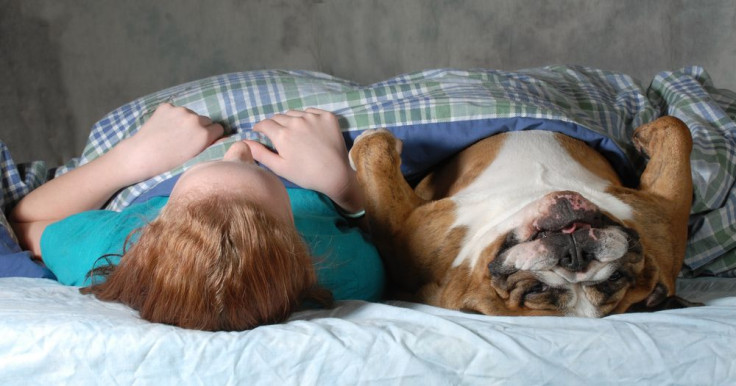Sharing A Bed With Man's Best Friend Is Costing You Sleep; 63% Of People Suffer Nightly

Night after night, your dog crawls into bed with you until, eventually, it becomes a routine — one that you may love. However, while your furry family member may cozy up to the idea of a king size bed, it’s ruining your precious sleep. New research, presented at the 28th SLEEP 2014 Annual Meeting of the Associated Professional Sleep Societies, proves that snuggling up to your pets in bed increases sleep disturbances throughout the night and ultimately decreases the total quality of sleep.
“The study determined that while the majority of patients did not view their pets intolerably disturbing their sleep, a higher percentage of patients experienced irritation — this may be related to the larger number of households with multiple pets,” Lois Krahn the study’s co-author and psychiatrist at Mayo Clinic said during his presentation.
In the study, 300 patients were asked 17 questions about their pets, if they had any, and their quality of sleep. Out of the 300 surveyed, 148 people were pet owners, and 54 percent said they shared their beds or bedrooms with their pet. Pet owners who slept with their pet more than four nights a week, regardless of the type of pet, 63 percent were shown to have poor sleep quality, and five percent said they always or almost always had trouble going back to sleep once they were awakened by their pet.
Sleep medicine has evolved over the past 25 years based with convergence of major developments in research, technology, awareness, and an unhealthier population creating demand for research. Even through constant medical discovery, sleep still remains one of the most poorly understood human biological functions. Despite these recent strides, Mayo Clinic researchers have still managed to determine the dangers of in-bed pet partners.
There aren’t exact numbers on how many humans sleep with their pets, although the Centers for Disease Control and Prevention estimates 14 to 62 percent of pet owners allow dogs and cats in their bed. Sleeping with man’s best friend may not be the best choice, considering the study found one in 10 sleep patients they studied had sleep problems directly related to their pet in bed.
“Pets really don’t belong in your bed,” Bruno Chomel, a professor at the University of California-Davis school of veterinary medicine and an expert in zoonosis, the transmission of disease from animal to human, told NBC News.
In the past, studies have looked at sleep disturbances through a romantic partner, a young child, or even a medical issue, but never pet possibilities. Mayo Clinic investigated the possibility of pet sleep disturbances for the first time ever because of significant rise in patients with sleep problems.
It makes sense to look into considering in the past two decades, the number of pet owners along with the number of pets per household in the United States is at its highest. The problems could stem from any number of things, such as barks, meows, pets with animated dreams of car chases, or even allergic reactions.
“One patient owned a parrot who consistently squawked at 6 a.m.,” Krahn said. “He must have thought he was a rooster.”
Chronic sleep deprivation results in daytime sleepiness, slower reflexes, poor concentration, and increased risk of car accidents. Long-term problems, which pose more severe health consequences, including diabetes, high blood pressure, heart disease, stroke and weight gain. According to the National Sleep Foundation, between 50 and 70 million Americans are affected by chronic sleep disorders.
Source: Duthuluru S, Krahn L. SLEEP 2014 28th Annual Meeting of the Associated Professional Sleep Societies. 2014.



























